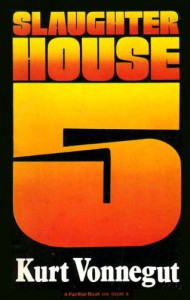Slaughterhouse Five or, The Children's Crusade
 Some books you just know are five stars when you finish them. They leave you feeling slightly dazed, awe-struck and your head is buzzing with thoughts as you begin to process the implications of what you have just read. This describes exactly the way I felt when I finished this book.
Some books you just know are five stars when you finish them. They leave you feeling slightly dazed, awe-struck and your head is buzzing with thoughts as you begin to process the implications of what you have just read. This describes exactly the way I felt when I finished this book.The story is about the absurdity of life and man's inhumanity to man, framed by the narrative of the time travelling protagonist Billy Pilgrim but refrains from being overly depressing by being offset by Vonnegut's astute and wry humour.
Billy does not travel through time in the conventional sense, only his awareness moves through different stages of his life, seemingly at random, yet he is convinced of his powerlessness to effect or change the course of events in his life. He cruises through a life doomed to experience many tragic events and despite having little will to survive, seems to somehow avoid death. He is apathetic in the extreme, accepting the good and the bad with equal ambivalence.
The story is steeped in irony. In Vonnegut's universe, one finds it everywhere one looks. For example, the title of the book is the place where Billy and his fellow prisoners of war shelter from the Dresden fire storm, a disused abattoir, in which they manage to avoid the death that most of the other inhabitants of Dresden, hiding elsewhere, suffer.
One can talk about this book freely without fear of spoilers. The fragmented style of the narrative works well here because it is not only the reader that flashes back to past events, we experience his past precisely as the protagonist does. There are no big surprises in store for Billy or the reader because he's already experienced it all and we join the narrative at a point near the end of his life.
I can't say much more other than that this is a great book that I would recommend to all. I'll just leave you with a quote from the book:
"God grant me the serenity to accept the things I cannot change, courage to change the things I can, and wisdom to always tell the difference."



